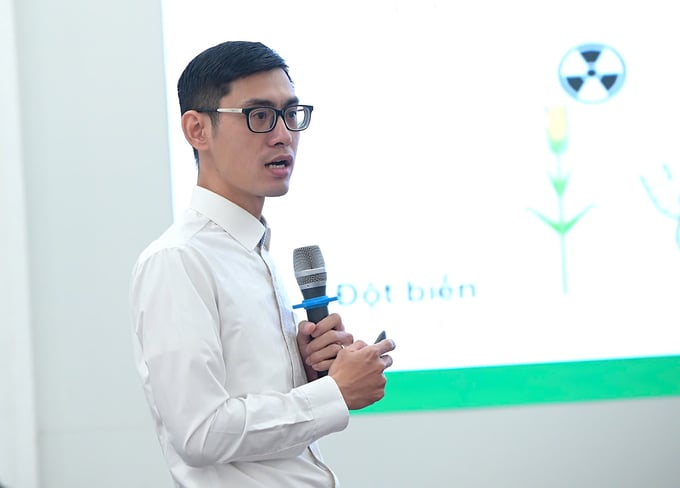November 26, 2025 | 08:18 GMT +7
November 26, 2025 | 08:18 GMT +7
Hotline: 0913.378.918
November 26, 2025 | 08:18 GMT +7
Hotline: 0913.378.918

Dr. Nguyen Duy Phuong, Head of Molecular Pathology Department, Agricultural Genetics Institute. Photo: Tung Dinh.
The CRISPR/Cas (Clustered Regularly Interspaced Short Palindromic Repeat/CRISPR-associated protein) gene-editing system, first developed in 2013, has revolutionized molecular biology research and opened up a promising new frontier for plant breeding.
Since 2017, the Agricultural Genetics Institute, part of the Vietnam Academy of Agricultural Sciences, has been an early adopter of this technology. The institute was also the first in Vietnam to be tasked with a state-level research project applying CRISPR/Cas technology.
The CRISPR/Cas9 system developed by the Institute can accurately induce mutations in 4 to 6 different locations within the host plant genome, surpassing the original system (transferred from France), which could only target two locations. Armed with this advanced CRISPR/Cas9 system, the Institute's researchers have utilized it for foundational research.
According to Dr. Nguyen Duy Phuong, industrial development has led to agricultural land contamination by heavy metals, with arsenic, cadmium, and lead posing the greatest danger to human health, livestock, and crops.
“Our research focuses on the development of the mutant rice line TBR225. This variety will help mitigate the risk of cadmium poisoning in areas with high cadmium concentrations in the soil, thereby contributing to public health protection,” said Dr. Phuong.
Additionally, the Agricultural Genetics Institute has worked diligently on the rice leaf blight resistance gene. Through their research on TBR225 and Bac Thom 7, the new rice varieties exhibit stable quality and, importantly, are not classified as genetically modified organisms (GMO).

Gene editing tools help molecular breeders easily eliminate negative factors. Photo: Tung Dinh.
Resistance to bacterial leaf blight was evaluated across three consecutive generations to ensure genetic stability. Remarkably, the agro-biological characteristics and quality of the mutant rice lines remained consistent with the original variety. The new variety successfully overcomes the limitations of earlier molecular breeding programs aimed at developing leaf blight-resistant rice through other techniques.
Dr. Phuong emphasized: "Climate change has brought significant challenges to rice production, including drought and heat stress. Developing rice varieties that can withstand climate change is a top priority in Vietnam's breeding programs."
In the future, the Institute plans to expand its research to include forestry species such as acacia and eucalyptus, industrial crops like tobacco and coffee, and fruit trees such as oranges and grapefruits. At the same time, the Institute will continue to enhance the quality of existing rice varieties.
For example, while Khang Dan 18 rice has favorable starch properties, it tends to be relatively hard. Bac Thom 7 is fragrant and sticky but lacks the starch quality found in some premium rice varieties on the market. Therefore, the Institute will continue to edit the genes regulating these characteristics.
“It can be confirmed that the Institute has successfully mastered and applied CRISPR/Cas9 gene-editing technology. Gene editing is an effective tool for selecting varieties suited for Vietnam’s agricultural conditions,” Mr. Phuong emphasized. He also urged the Ministry of Agriculture and Rural Development, the Department of Crop Production, and the Department of Science, Technology, and Environment to implement supportive policies that would help bring the Institute’s research to more farmers.

Drought- and heat-tolerant rice varieties (left) compared with regular rice varieties in the laboratory. Photo: Tung Dinh.
In addition to research on bacterial blight, the Agricultural Genetics Institute is also focusing on gene-editing for blast resistance. Importantly, the Institute commits to ensuring that the characteristics of the modified varieties remain unchanged from the original base varieties after research. This will be a primary research direction in the future, alongside other research initiatives. These efforts aim to provide more practical products for agricultural production and contribute to the advancement of basic science in Vietnam.
This gene-editing system boasts significant advantages over earlier methods, offering simplicity, affordability, accuracy, high efficiency, and exceptional flexibility. It allows for precise mutations to be made at almost any location in an organism's genome, whether by adding, removing, or replacing nucleotides, genes, or even segments of chromosomes. With CRISPR/Cas, molecular biologists can fully manipulate an organism's genome, enabling them to control gene expression, alter chromosome structure, or introduce specific genetic modifications in a highly targeted manner.
In short, "we can do anything we want to the genome" with the CRISPR/Cas system. The profound potential of this tool was recognized in 2020 when the Nobel Prize in Chemistry was awarded to two researchers responsible for its invention.
Translated by Quynh Chi
/2025/11/24/3536-2-112800_176.jpg)
(VAN) Dong Nai now has tens of thousands of hectares of forests certified for sustainable management, and this area will continue to be expanded in the coming period.

(VAN) Vinh Ha hamlet (Dai Xuyen commune, Hanoi) is shifting away from small-scale farming as households adopt bioscurity into their breeder chicken models.

(VAN) Heavy rains make aquatic species more vulnerable to disease. Proactive water management and high-tech systems help farmers prevent outbreaks and protect yields.

(VAN) Greenhouses are shifting production mindsets in Binh Lu commune, enabling farmers to ‘weather the sun and rain’ and secure stable vegetable harvests throughout the year.

(VAN) Green transition is crucial for the Mekong Delta amid climate change and stricter standards, offering a path toward sustainability.

(VAN) Dong Thap promotes agricultural restructuring, forms large specialized farming zones, raises the value of agricultural products and develops toward ecological and high-tech directions.
/2025/11/22/4018-4-213342_747.jpg)
(VAN) The Mekong Delta Agricultural Experts Club has attracted 143 experts and researchers to participate in providing consultancy and contributing initiatives to the development of one million hectares of high-quality rice.